The news that MK Lightning will join the Elite League in 2017/18 has caused much debate across the British Ice Hockey scene.
Director Todd Kelman revealed last week there would be announcement in the next couple of months about new teams joining the league for the season after next, sparking plenty of rumours as to who those teams might be.
Over the course of the Easter weekend BIH were told that Milton Keynes and Blackburn were leading the race to be included as a new franchise in the league.
Rather than speculate, we decided to check the rumour with both clubs on Tuesday morning.
A spokeswoman for Lightning said she “had heard nothing regarding the club moving to the Elite League”, while Silver Blades’ director Mark Johnson confirmed “100% the Hawks have not had talks with or made an application to the league”.
Johnson also denied the Hawks were considering a move to the EPL, highlighting the current situations at Manchester Phoenix and Bracknell Bees as a concern for any club thinking about joining the league.
By 3.00pm on Tuesday Lightning’s place in the Elite League was confirmed and the rumour mill swung into action once again.
Lightning to join Elite League from 2017-18https://t.co/wflWwhubBc
— MKL Official (@MKL_Official) March 29, 2016
So where does this leave British Ice Hockey? The most obvious question at this stage is who else is looking to join the country’s top league?
Given Lightning’s initial denial followed by the league confirming within hours they were making the step up, would anyone be surprised if Blackburn actually were interested in joining them?
Suitable rink? Tick. Potential to grow the fanbase? Tick. A geographical fit with the Erhardt Conference? Tick. It all makes sense, doesn’t it? Not according to their new owners.
If it isn’t Blackburn, then who? Leeds? Risky. Aberdeen? Perhaps. Dublin? Possibly, if this development comes to fruition. London? ‘On the horizon’ according to Kelman.
Maybe it’s another EPL team? Guildford Flames? People say they’ve got the resources, but could ‘politics’ get in the way?
Basingstoke Bison? They dropped into the EPL in 2009 after struggling to make ends meet in the Elite League – can they afford to go back up?
Perhaps the most worrying aspect of Tuesday’s announcement is the potential impact the Elite League’s expansion might have on the sport in Britain lower down the scale – particularly the second tier.
While it was refreshing to read that the Planet Ice and Silver Blades brands have committed to “deliver an additional team so that the EPL can continue to develop and grow” when Lightning move up, what would happen if others decided to jump ship?
Arguably the likes of Guildford and Basingstoke are ‘too big’ for the EPL and would be a better fit in the Elite League, but for teams like Swindon Wildcats, Peterborough Phantoms and others it’s a level which works well for them.
The Elite League’s Media Consultant, Seth Bennett, commented on Twitter that Britain would be better served with a zero import, U23 league with five over age players as its second tier, but is that really something that EPL fans would embrace?
@thepyre we would be better served with a 0 import u23’s league with 5 over age players. That to me is a better idea for improving uk hockey
— Seth Bennett (@Sethb45) 29 March 2016
The term ‘development league’ is trotted out time and again when people discuss the EPL, yet when you have teams attracting four-figure gates and charging £12-plus to watch, can you legitimately still make that claim?
Even describing the third tier in Britain, the NIHL, as a development league seems wrong when you consider the size of attendances at some clubs in both the North and South sections.
While the Elite League will be criticised for putting its own interests first by expanding its numbers, the growth could actually benefit the sport in Britain if certain issues are addressed.
Unified governance and junior development are two areas which need serious attention, but that’s a whole other discussion.
With Bennett also saying he believes Britain is ‘closer now to a pyramid system than we have been in years’ let’s hope that sentiment is carried forward into any future discussions about league structures as whole.
@thepyre in my opinion it is a good move for British hockey. We are closer now to a pyramid system than we have been in years
— Seth Bennett (@Sethb45) March 29, 2016
Ensuring the lower levels remain sustainable whilst also providing a pathway for players to progress is essential to the health of the British game.
To put that another way – a building is only as good as its foundations. Hopefully the decision-makers won’t lose sight of that.
After all, the last thing anyone should want is a repeat of the Ice Hockey Superleague shenanigans.
(Image permission: Tony Sargent)









